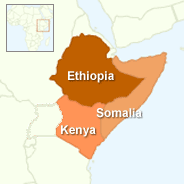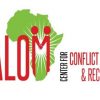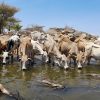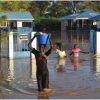
Author and Page information
- This page: https://www.globalissues.org/article/796/east-africa-food-crisis.
- To print all information (e.g. expanded side notes, shows alternative links), use the print version:
On this page:
Introduction
 Into mid-2011, the world’s worst food crisis is being felt in East Africa, in Ethiopia, Somalia and Kenya.
Into mid-2011, the world’s worst food crisis is being felt in East Africa, in Ethiopia, Somalia and Kenya.
Despite successive failed rains, the crisis has been criticized as avoidable and man-made. This is because the situation had been predicted many months before by an international early warning system. Both the international community and governments in the region have been accused of doing very little in the lead up to this crisis. In addition, high food prices have forced food out of the reach of many people, while conflict in Somalia has exacerbated the situation.
As the international organization Oxfam describes: 12 million people are in dire need of food, clean water, and basic sanitation. Loss of life on a massive scale is a very real risk, and the crisis is set to worsen over the coming months, particularly for pastoralist communities.
Early warning systems had predicted this months earlier
As Inter Press Service (IPS) reported, despite the conflicts in the region,
The world had an opportunity to save thousands of lives that are being lost in parts of Somalia due to the famine, if only the donor community had paid attention to the early warning systems that predicted it eight months ago.
…
There has been a catastrophic breakdown of the world’s collective responsibility to act. 3,500 people a day are fleeing Somalia and arriving in parts of Ethiopia and Kenya that are suffering one of the driest years in six decades. Food, water and emergency aid are desperately needed. By the time the U.N. calls it a famine it is already a signal of large scale loss of life,Oxfam said.
Knowing about these things in advance is significant in terms of lives, costs and preparedness. The US government agency USAID’s Famine Early Warning System Network had predicted the crisis in November 2010, noting that
food security outcomes are likely to worsen, particularly among the poorest households whose coping capacity is the most limited.
In areas at‐risk of worsening food security, households may require livelihood support to prevent asset loss, household food deficits, and negative coping. Potential interventions in pastoral areas include rehabilitation of water points (boreholes), increased veterinary services targeting the dry season grazing areas, commercial off‐take programs, and nutrition support programs targeting poorer households. In the cropping southwest marginal areas of Kenya, and in Rwanda and Burundi, the scale‐up of resource transfer programs may be required to minimize the food security impacts of the La Niña event [that was observed at the end of 2010].
Massive funding shortfall — assuming anyone cares
As international humanitarian and development organization Oxfam explained, many (often simple) preventative actions could have been taken, assuming funds were available earlier:
Whenever there is an indicator of such a disaster, we must not only sit and wait for the emergency response. We can conveniently invest the funds by putting irrigation systems in place, vaccinating people, especially children, against anticipated diseases, and creating proper infrastructure to be used in case there is need for food supply,said [Anna Ridout, Oxfam’s spokesperson]
But, as Oxfam notes in another article, donors and governments fail to deliver on East Africa aid effort:
The overall humanitarian requirements for the region this year, according to the UN appeals, are $1.87 billion. These are so far 45 percent funded, leaving a gap of over $1 billion still remaining: gaps of $332m and $296m for the Kenya and Somalia UN appeals respectively, and $398m for the government-run appeal in Ethiopia
In the last two weeks there have been new pledges of $205m, leaving a gap of $800m still remaining.
The UK has pledged an estimated $145m in the past two weeks – almost 15 percent of what is needed. The EU has pledged around $8m so far, with more expected in the coming days. Spain has pledged nearly $10m, Germany around $8.5m. France has so far not pledged any new money, and Denmark and Italy have said no significant new sums are available.
But it is not just the international community. Various actors in the region also face criticism and question. For example, as the above IPS article had also noted, the effects of the drought were made worse by the Al Shabaab militia group in Somalia, which had blocked donor agencies from operating within its territories in 2009 — now the famine zones. Admittedly, the extremist group recently lifted its ban, as IPS also noted.
Another example is the governments of the affected countries as well as the African Union. Ugandan journalist, Rosebell Kagumire, writing for Oxfam, noted that the African Union had complained about lack of funds because governments have not put enough money in. Although Kenya opened its borders for an influx of Somalian refugees, Kagumire criticized the response as lacking urgency and not being effective.
One of the worst crises in recent history
The crisis is one of the worst in recent history:
Compared to previous famines, the current situation in Somalia compares or exceeds those reported during recent years in Niger (2005), Ethiopia (2001), Sudan (1998) and Somalia (1992). However, this is the most severe food security crisis in Africa since the 1991/92 Somalia famine, according to the U.N. Between January and June this year, 300,000 people in Mogadishu were given food assistance by humanitarian agencies on a monthly basis. Approximately 100,000 malnourished children were treated through some 418 nutrition centres in south Somalia from January to May 2011.
…
The current crisis in Somalia is expected to have an increasingly devastating effect on other countries in the region. However, generally, the Horn of Africa has 11.5 million people in crisis, including the 3.7 million in Somalia.
Somewhat predictably, media coverage seems spotty. At times there are detailed reports, often responding to government and other large international agency pushes to address the crises. Other times, the coverage vanishes from mainstream headlines and prime time viewing almost as soon as reporting has started.
On the morning of Sunday, July 31, during a review of British Sunday newspapers by the BBC, commentators noted how only one paper had a front page story about this crisis while almost all of them had something about a second Royal wedding. (It wasn’t necessarily ignoring Africa, either, as the also important story about the US debt crisis also barely featured on any papers headlines!)
And of course, most of the reporting has followed after the crisis has happened.
It is also interesting to note how quickly the international community
mobilized against Libya with military and other actions, when far less people (in number) were affected.
More information
For more about the issues from other organizations, here are some starting points:
News stories from IPS
Below is a list of stories from Inter Press Service as they cover this event. Revisit this page frequently to see newer stories as the crisis unfolds:
-
Faster and safe aid access critical to keep famine and disease at bay in Gaza
– UN News

As the risk of famine grows in Gaza and more people are exposed to deadly diseases, the heads of three UN agencies – the World Food Programme (WFP), the UN Children’s Fund (UNICEF) and the World Health Organization (WHO) – called for faster and safer aid access to the enclave.
-
Turning Protracted African Conflicts into Sustainable Peace
– Inter Press Service

NAIROBI, Kenya, Jan 22 (IPS) – Among East Africa’s dozens of pastoral tribes, major conflicts have erupted repeatedly, largely over land and water disputes.
Generational trauma and anger have built to create tensions and grievances that carry emotional weight even hundreds of years later.
-
UN urges radical change to aid relief access in Gaza amid fresh famine fears
– UN News

After more than 100 days of war in Gaza and no let-up in sight, senior UN humanitarians issued a rare joint appeal for greater aid access on Monday, expressing renewed fears of death due to famine and disease unless there is a “fundamental step change” in procedures.
-
COP28 Hits: Key Wins as Africa-Focused Pledges, Deals Announced
– Inter Press Service

DUBAI, Dec 08 (IPS) – A record-breaking drought is unfolding in the Horn of Africa, where millions of people are trapped in the world’s worst acute food insecurity emergency. Food insecurity and malnutrition in West and Central Africa are on track to reach a 10-year high as coastal countries edge even closer to the debilitating effects of climate change.
-
Unprecedented drought emergency demands urgent action
– UN News

A new report by the UN team combatting desertification reveals alarming trends over the past two years which have resulted in an unprecedented emergency due to human-induced droughts.
-
Displaced families uprooted by severe floods across Horn of Africa
– UN News

Severe floods in the Horn of Africa have affected tens of thousands of displaced families in Ethiopia, Kenya and Somalia, putting lives and livelihoods at risk, the UN refugee agency, UNHCR, said on Friday.
-
Women hold the Key to Success of Pastoralism in Africa
– Inter Press Service

NAIROBI, Oct 17 (IPS) – Women in pastoralist areas of East Africa are critical to the health of livestock in their communities, holding the key to effective animal vaccination campaigns meant to protect herds against deadly diseases.
-
At UN, Horn of Africa nations urge global solidarity and real reform
– UN News

As UN General Assembly’s general debate continued Saturday, Horn of Africa nations made a strong plea for action to rescue a world teetering on the precipice of climate catastrophe and struggling under the weight of an outdated and unfair global financial system.
-
Africa Climate Summit: a Critical Opportunity for Collective Action on Climate Change
– Inter Press Service

NAIROBI, Sep 01 (IPS) – As an African, I have seen first-hand the devastating effects of climate change. I have met communities displaced by floods in Malawi, Mozambique and Zimbabwe. I have spoken to farmers from Northern Kenya who have lost their crops to drought. These experiences have made me acutely aware of how urgent it is to address the climate crisis.
-
Bridging troubled waters amid deluge, drought in the US
– UN News

A global approach to tackle the ongoing water crisis is needed as vulnerable communities in the United States face historic deluge and drought – issues very much in the spotlight at the forthcoming UN-supported World Water Week.
-
Drought-Displaced Afghan Peasants Yearn for Their Rural Life
– Inter Press Service

Jul 17 (IPS) – The author is an Afghanistan-based female journalist, trained with Finnish support before the Taliban take-over. Her identity is withheld for security reasons.Baba Jan, 60, a farmer in Badghis Province in Afghanistan has been forced to leave his home, not because of the war but due to the worst drought he has ever experienced. It is the second time this year he has been forced to leave his cherished home and life in the rural area for capital city, Kabul.
-
East African International Students to Benefit from Single Qualification Framework
– Inter Press Service

NAIROBI, Jul 11 (IPS) – East African international students could soon easily study in neighbouring countries after the Intergovernmental Authority on Development (IGAD) proposed a new qualification framework to mitigate the difficulties faced when seeking education across borders.
-
Grey Market Charcoal East Africa Why Prohibitionist Interventions Are Failing
– Inter Press Service

KAMPALA, Jul 10 (IPS) – At Kampala’s Nakawa market, Lovisa Nabisubi scoops charcoal from a bag and packs it into tins ready for customers. Her bare hands, feet, and clothes are stained black from hours of dealing in this popular household fuel which some equate to “black gold” not just in Uganda but in most of East Africa.
-
Horn of Africa: Around 60 million in urgent humanitarian need
– UN News

Climate, armed conflict, high food prices and post-COVID-19 economic fall-out have caused record food insecurity in the Horn of Africa, with an estimated 60 million urgently in need of help, UN humanitarian agencies warned on Monday.
-
Women suffer disproportionately from ravages of drought, desertification
– UN News

Women’s land rights are in the spotlight ahead of the World Day to Combat Desertification and Droughtobserved on 17 June, at events around the world, from Kenya to Viet Nam, including a high-level event at UN Headquarters in New York on Friday.
-
UN and partners seek $7 billion to prevent catastrophe in the Horn of Africa
– UN News

With “crisis atop of crisis” threatening millions in the Horn of Africa, the international community cannot afford to stand idly by, Secretary-General António Guterres said at a pledging event to raise $7 billion for the region, held at UN Headquarters in New York on Wednesday.
-
Horn of Africa: Over 7 million children under the age of 5 remain malnourished
– UN News

Children in the Horn of Africa are living through an unprecedented large-scale crisis of hunger, displacement, water scarcity, and insecurity, the UN Children’s Fund (UNICEF) said on Monday.
-
Horn of Africa hunger emergency: ‘129,000 looking death in the eyes’
– UN News
-
Refugee agency appeals for $137 million to help displaced in Horn of Africa
– UN News

Lifesaving aid is needed urgently to help millions of people enduring one of the longest and most severe droughts on record in the Horn of Africa, the UN refugee agency, UNHCRsaid on Tuesday, as the region enters its sixth consecutive rainy season with no rain.
-
Horn of Africa: $84 million appeal to support migrants along risky route to Yemen
– UN News

The International Organization for Migration (IOM) and partners are seeking $84 million to provide humanitarian and development assistance to over one million migrants in the Horn of Africa and communities hosting them.
-
In drought-stricken Cabo Verde, UN chief finds hope for creating sustainable oasis
– UN News

The Secretary-General spent Sunday travelling through the diverse and varied landscapes of Santo Antão, where, after five years of intense drought, several development projects supported by the United Nations are helping to transform the agricultural sector of this westernmost island of Cabo Verde.
-
Kenya: Severe drought fuels malnutrition, reduces hospital-delivery births in Turkana County
– UN News

Following four successive failed rainy seasons, Kenya is amid the worst drought in 40 years, the UN’s women’s health agency, UNFPA, said on Tuesday, shining a light on 134,000 pregnant or breastfeeding women who are reported to be acutely malnourished and in need of treatment.
-
War, Famine, Disease, Disasters – 2022 – a Year Staring at Apocalypse
– Inter Press Service

TORONTO, Canada, Dec 23 (IPS) – A year that started with Russia’s invasion of Ukraine and is ending with famine in Africa, while still spreading death and misery through an enduring pandemic and a deteriorating climate crisis — 2022 has been an apocalyptic warning of the frailty of our planet and the woeful shortcomings of humankind.
-
Horn of Africa faces most severe drought in more than two generations – UNICEF
– UN News

The number of children suffering from dire drought conditions across Ethiopia, Kenya and Somalia has more than doubled in five months, the UN Children’s Fund (UNICEF) said on Thursday.
-
Somalia: Urgent support needed for rural communities facing famine
– UN News

Famine is fast approaching in Somalia and more than 700,000 people could face starvation next year, the Food and Agriculture Organization (FAO) warned on Tuesday, citing the latest Integrated Food Security Phase (IPC) analysis.
-
Somalia: Famine narrowly averted – so far, warn UN humanitarians
– UN News

In Somalia, a full-blown famine has been narrowly averted for now, but the hunger emergency has not gone away, UN humanitarians said on Tuesday.
-
No time to waste, as Haiti famine risk rises, warns UN emergency food aid agency
– UN News

With armed gangs in charge of key transport routes in Haiti, the country could see famine conditions, unless a robust humanitarian aid plan is put in place, the head of the World Food Programme (WFP) in Haiti, Jean-Martin Bauer, has warned.
-
Drought, conflict force 80,000 Somalis to shelter in Kenya’s Dadaab refugee camps
– UN News

Tens of thousands of people have sought shelter in recent weeks at Kenya’s Dadaab camps, forced from their homes by extremist violence in neighbouring Somalia and an “unrelenting” drought, the UN refugee agency, UNHCR, said on Tuesday.
-
‘We cannot give up’ on the millions suffering in drought-stricken Horn of Africa, urges WFP official
– UN News

Millions of people in the Horn of Africa – a region at the intersection of some of the worst impacts of climate change, recurring humanitarian crises and insecurity – are facing the driest conditions in four decades along with extreme food shortages. The top UN World Food Programme (WFP) official in the region, Michael Dunford, is warning that the situation there is likely to get worse before it improves.
-
Pan-African Approach to Tackle Food Insecurity Arising from Conflict and Climate Shocks
– Inter Press Service

Nairobi, Nov 22 (IPS) – Upheaval on the global stage, the war in Ukraine, conflict in the Horn of Africa, severe climatic shocks, high international inflation, increasing global commodity prices, high prices of agricultural inputs and low intra-continental trade are fuelling food insecurity across Africa.
Author and Page Information
- Created: